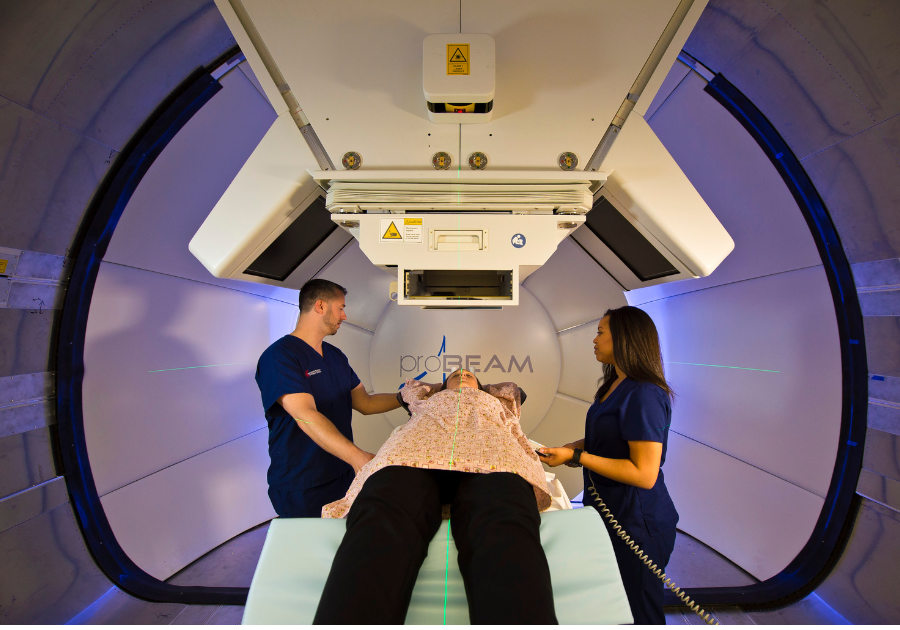Treating Breast Cancer with Proton Therapy
October 20, 2023
The latest national figures confirm that one in eight women will be diagnosed with breast cancer in their lifetime, and that breast cancer accounts for 12.5% of new annual cancers worldwide. Around two-thirds of women with breast cancer will be recommended for radiation as part of their treatment. The good news is that with advancements in treatments, breast cancer cure rates are continuing to improve and remain high for many patients.
Breast cancer is usually treated with more than one modality, although not all patients need chemotherapy as one of them. If a woman has a lumpectomy, or surgical removal of the tumor and a rim of tissue around the tumor, radiation therapy is usually indicated as an additional treatment. If a woman has a mastectomy, or the removal of the entire breast, radiation is indicated in certain situations, such as positive lymph node(s) or skin involvement.
Dr. Elizabeth Nichols
Vice Chair of Clinical Affairs, Associate Professor of Radiation Oncology, University of Maryland School of Medicine
Proton Therapy Treatment for Breast Cancer
Recent studies have concluded that cure rates following external beam proton therapy are the same as regular radiation. Proton therapy directs the radiation dose to the tumor, precisely targeting the area with pinpoint accuracy. Proton therapy reduces the amount of radiation exposure to surrounding healthy tissuessuch as the lungs, heart, lymphatic system and the other breast Non-invasive, painless and well tolerated by patients, proton therapy serves patients with an accuracy of <1 mm and requires just minutes to administer.
In many cases, women with early stage breast cancers do not have a significant benefit to the use of proton therapy compared to traditional photon radiation. The patients who may benefit the most from proton therapy are those with advanced, lymph node positive disease where we need to treat the lymph node areas, particularly the lymph node chains under the breast bone, close to the heart. We think about it more for women with left-sided disease as the heart lies anatomically on the left side of the chest. Women under 40 years old who are diagnosed with breast cancer are also excellent candidates for proton therapy as we want to limit exposure and reduce long-term implications. It is also the radiation therapy of choice for women with genetic mutations such as BRCA 1, 2 where there is a high risk of developing another cancer in the future. Lastly, proton therapy is indicated for patients who have undergone prior radiation to the chest whether for breast cancer, Hodgkin’s lymphoma, lung cancer or others. If you are unsure if you or a patient are a good candidate for proton therapy, please contact us for a consultation.
Long Term Impact

Radiation to the heart has been shown to be a risk factor for heart disease down the line just likeother medical conditions such as diabetes andhigh blood pressure or smoking. Proton therapy exposes the heart to less radiation with the expectation that this will reduce the long-term risks to the heart. This is particularly important for women with a personal history of heart disease or those with a strong family history of heart disease.
When it comes to the lung, the incidence of having lung issues from breast cancer radiation is already very small. However, proton therapy imparts an even lower dose of radiation to the lung. We never want to consciously give a vital organ extra radiation.
With lymphedema, many of the risks are driven by surgery and the number of lymph nodes removed. Proton radiation allows us to spare nearby tissues behind the shoulder and under the armpit that oftentimes receive a moderate radiation dose with photon therapy. There is increasing evidence that suggests the risk of lymphoma with the use of proton radiation is reduced as we are sparing collateral areas enabling the body to better accommodate and manage lymphatic flow.
Women with a history of breast cancer have an increased risk of developing cancer in the unaffected breast. Avoiding additional radiation to the other breast is important to lower the risk of developing cancer in the future.
The Future of Proton Therapy
With many research studies underway, the use of proton therapy continues to be promising with an expected reduction in heart events and long term side effects. Proton therapy has already been shown to result in fewer second cancers.
The use of proton therapy continues to be the focal point of research studies. For instance, a large national trial has just completed accrual with around 1,200 patients participating. MPTC is a participating center in this study and is also involved in our own research projects evaluating outcomes for patients treated with proton therapy.



